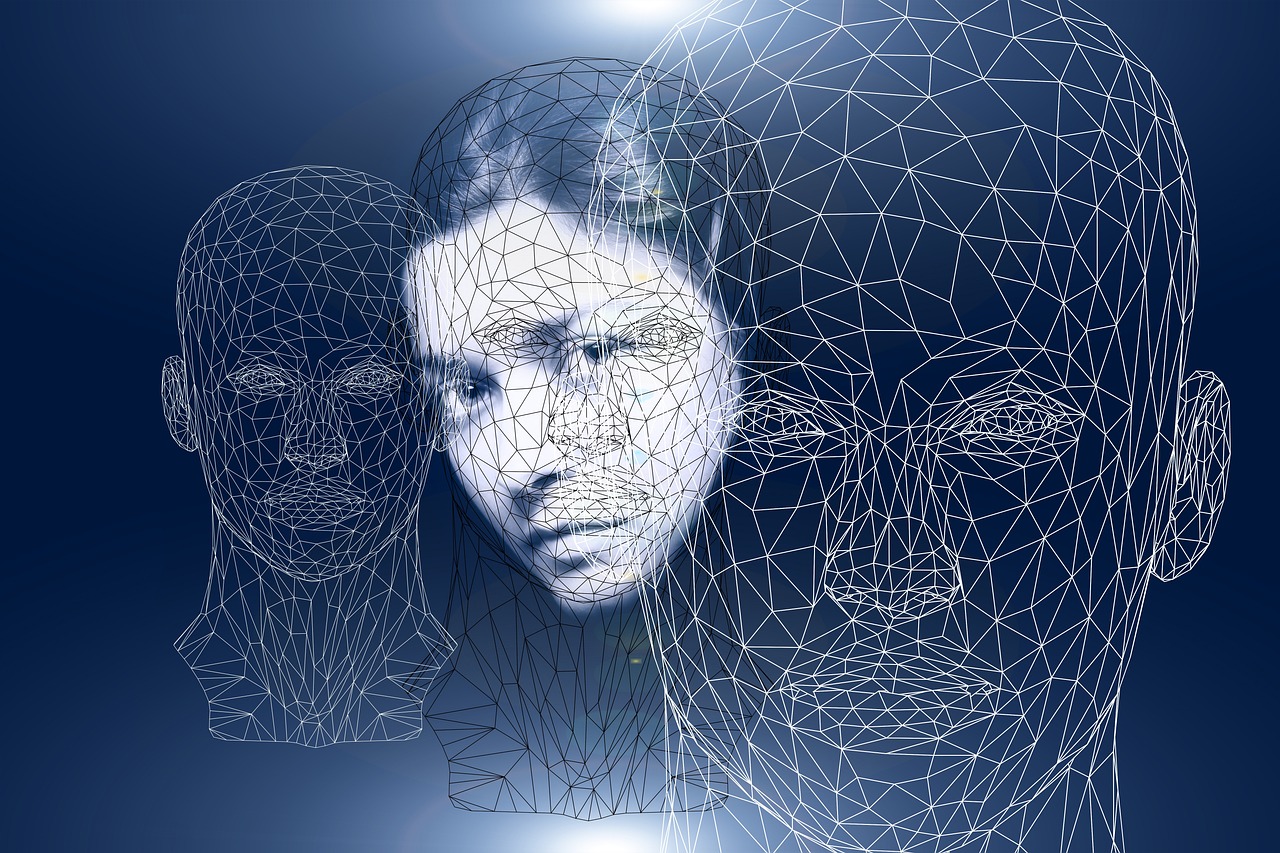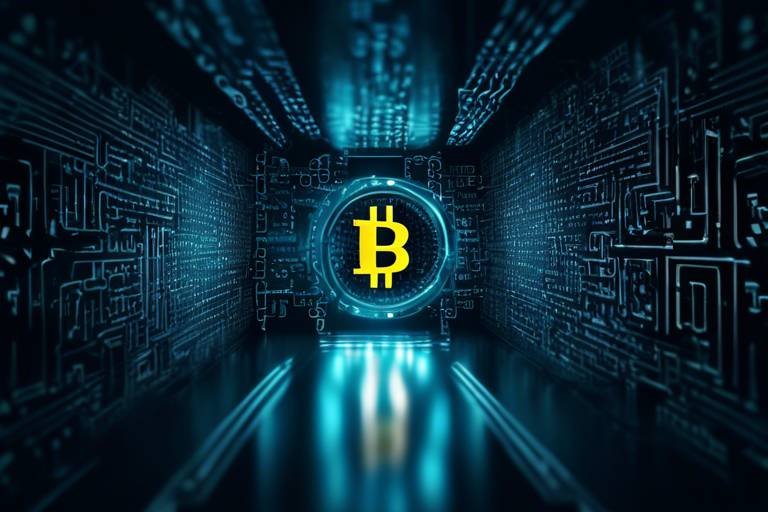The Growing Importance of Decentralized Identity Solutions
In our rapidly evolving digital landscape, decentralized identity solutions are emerging as a beacon of hope for individuals seeking greater control over their personal information. As we increasingly rely on digital platforms for everything from banking to healthcare, the need for a robust identity management system has never been more pressing. Traditional identity systems, which often rely on centralized databases, pose significant risks, including data breaches and identity theft. This is where decentralized identity comes into play, offering a paradigm shift that not only enhances security but also empowers users.
Imagine a world where you are the sole custodian of your personal data, where you can choose what information to share, with whom, and when. This is the essence of decentralized identity. By leveraging blockchain technology and cryptographic techniques, decentralized identity solutions allow individuals to create a digital identity that is not tethered to any single authority. Instead of having your information stored in a vulnerable central database, it is distributed across a network, significantly reducing the chances of unauthorized access.
Moreover, the benefits of decentralized identity extend beyond mere security. They promise to revolutionize how we interact with digital services, offering enhanced privacy, user control, and the potential to minimize surveillance. As we dive deeper into this topic, we will explore the foundational concepts of decentralized identity, its key benefits, the challenges it faces, and its real-world applications, ultimately painting a picture of its transformative potential in the digital age.
Decentralized identity refers to a digital identity model that gives individuals control over their personal information. Unlike traditional identity systems, which are often managed by centralized authorities such as governments or corporations, decentralized identity allows individuals to own and manage their own data. This section delves into its foundational concepts and how it differs from traditional identity systems.
The rise of decentralized identity solutions brings with it a plethora of advantages that can fundamentally change the way we manage personal data. These benefits include enhanced privacy, increased security, and greater user control. In the following sections, we will outline these benefits and discuss how they can transform personal data management.
One of the primary benefits of decentralized identity is improved privacy. With decentralized identity, individuals can manage their data without relying on centralized authorities, significantly reducing the risk of data breaches. By controlling their information, users can decide what data to share and with whom, minimizing exposure to potential threats. This level of privacy is especially crucial in an age where personal information is often exploited for profit.
Decentralized identity empowers users by granting them ownership of their data. This shift in control has profound implications for individuals and organizations alike. Users can maintain their privacy and security while still engaging with various services, knowing they are not at the mercy of third-party data handlers. The concept of data ownership also encourages organizations to adopt more ethical practices when it comes to handling personal information.
With decentralized identity, the potential for surveillance is minimized. This model can help protect individuals from unwanted monitoring and data exploitation. By decentralizing identity management, we can create a more equitable digital environment where personal freedoms are respected, and individuals are not constantly tracked and analyzed.
Decentralized identity systems enhance security through advanced cryptographic techniques. These methods protect user identities and reduce the likelihood of identity theft. By using blockchain technology, decentralized identity solutions create a secure, tamper-proof record of transactions that can be verified without revealing sensitive information. This innovation not only safeguards individual identities but also fosters trust between users and service providers.
Despite its numerous advantages, decentralized identity faces challenges that must be addressed for wider adoption. These challenges include technological barriers and regulatory concerns. Understanding these obstacles is crucial for stakeholders looking to implement decentralized identity solutions effectively.
Implementing decentralized identity solutions requires advanced technology and infrastructure. Developers and organizations must overcome various technical challenges, including scalability, interoperability, and user interface design. These hurdles can impede the widespread adoption of decentralized identity systems, making it essential for innovators to collaborate and share knowledge.
Regulatory frameworks for decentralized identity are still evolving. Legal challenges and considerations can impact the adoption of these systems. Policymakers must strike a balance between fostering innovation and ensuring consumer protection, creating a legal landscape that supports the growth of decentralized identity solutions.
Decentralized identity solutions are being implemented across various sectors, showcasing their practical benefits and effectiveness. From financial services to healthcare, these solutions are transforming how organizations manage identities and protect sensitive information.
In the financial sector, decentralized identity can streamline customer verification processes. Banks and fintech companies are leveraging these solutions to enhance security and user experience. By reducing the need for extensive paperwork and manual verification, decentralized identity solutions can expedite transactions and improve customer satisfaction.
Decentralized identity has significant implications for healthcare, enabling secure patient data sharing. This technology can improve patient privacy and streamline access to medical records. By allowing patients to control their health information, decentralized identity can foster trust between patients and healthcare providers, ultimately leading to better health outcomes.
The future of decentralized identity solutions is promising, with advancements on the horizon. Emerging trends, potential innovations, and the evolving landscape of digital identity management will shape how we interact with technology in the coming years.
As decentralized identity solutions mature, interoperability will become crucial. Seamless integration across platforms and services will facilitate widespread adoption and enhance user experience. By creating a cohesive ecosystem, users can manage their identities across various applications effortlessly.
Future developments will likely focus on user-centric design, making decentralized identity more accessible. Innovations in design can enhance user experience and engagement, ensuring that individuals feel empowered to take control of their digital identities.
Q1: What is decentralized identity?
A: Decentralized identity refers to a digital identity model that gives individuals control over their personal information, allowing them to manage their data without relying on centralized authorities.
Q2: How does decentralized identity enhance privacy?
A: It allows users to control what information they share and with whom, reducing the risk of data breaches and unwanted surveillance.
Q3: What are the challenges of implementing decentralized identity solutions?
A: Challenges include technological hurdles, regulatory concerns, and the need for interoperability among different platforms.
Q4: In which sectors are decentralized identity solutions being applied?
A: They are being implemented in various sectors, including financial services and healthcare, to enhance security and improve user experience.

[Understanding Decentralized Identity]
Decentralized identity is a revolutionary concept in the realm of digital identity management. Unlike traditional identity systems that rely on centralized authorities—like governments or large corporations—decentralized identity empowers individuals by giving them control over their personal information. Imagine having a digital identity that you can manage, share, and revoke at will, without the need for a third-party intermediary. This shift is akin to moving from a world where you need a key to access your own home to one where you can simply unlock the door with your own unique fingerprint.
At its core, decentralized identity is built on blockchain technology and cryptographic principles. This means that personal data is not stored in a single location, making it much harder for hackers to breach. Instead, information is distributed across a network, allowing users to maintain ownership and control. For instance, when you want to verify your identity for a service, instead of sharing your entire identity, you can provide only the necessary credentials. This selective sharing is a game-changer in terms of privacy and security.
To understand decentralized identity better, it's essential to recognize how it contrasts with traditional identity systems. In a conventional setup, your identity is often tied to a specific entity, like a bank or a government database. If that entity suffers a data breach, your personal information could be compromised. In contrast, decentralized identity systems allow for:
- Self-sovereignty: Users have full control over their data.
- Privacy: Individuals can choose what information to share and with whom.
- Security: Data is stored in a way that minimizes the risk of unauthorized access.
This new paradigm not only enhances security and privacy but also fosters trust in digital interactions. As we continue to navigate a world increasingly reliant on digital communication, understanding and adopting decentralized identity solutions will be crucial. They promise a future where individuals can interact online with confidence, knowing that their personal information is secure and under their control.

[Key Benefits of Decentralized Identity]
Decentralized identity solutions are rapidly gaining traction in today's digital landscape, and it's easy to see why. Imagine a world where you are the sole custodian of your personal information, free from the clutches of corporations and governments that often mishandle or misuse your data. This is the promise of decentralized identity. It offers a plethora of benefits that not only enhance user experience but also revolutionize how we perceive and manage our digital identities.
One of the most significant advantages of decentralized identity is enhanced privacy. In a traditional identity system, your personal data is stored in centralized databases, making it a prime target for cybercriminals. With decentralized identity, your information is cryptographically secured and distributed across a network, making unauthorized access nearly impossible. This means you can share only the information necessary for a specific interaction, without exposing your entire identity. For instance, when verifying your age for a service, you can simply provide a proof of age without revealing your name or other sensitive details.
Another crucial benefit is data ownership. In the digital age, data is often referred to as the new oil. However, most individuals have little control over their own data. Decentralized identity flips this narrative, granting users complete ownership and control over their personal information. This empowers individuals to decide what data to share, with whom, and for how long. Organizations, on the other hand, can benefit from this model by ensuring compliance with data protection regulations, fostering trust and transparency with their customers.
Moreover, decentralized identity significantly reduces the risks associated with surveillance. In a world where data is constantly being collected and analyzed, the potential for unwanted monitoring is a growing concern. By utilizing decentralized identity solutions, individuals can protect themselves from invasive tracking by allowing only necessary data to be shared. This creates a more secure environment where personal freedom is respected, and individuals can navigate the digital world without fear of being watched.
In addition to privacy and ownership, decentralized identity solutions also enhance security. Traditional identity systems are vulnerable to data breaches, which can lead to identity theft and fraud. Decentralized identity employs advanced cryptographic techniques that safeguard user identities and significantly reduce the likelihood of such incidents. For example, blockchain technology can be used to create immutable records of identity verification, making it virtually impossible for hackers to alter or forge identities.
To summarize, decentralized identity solutions offer a range of key benefits that can transform personal data management:
- Enhanced Privacy: Control over personal information and reduced risk of data breaches.
- Data Ownership: Empowerment of users to manage their data.
- Reduced Surveillance: Protection from unwanted monitoring and tracking.
- Increased Security: Advanced cryptographic methods to safeguard identities.
As we move forward in this digital age, embracing decentralized identity solutions could very well be the cornerstone of a more secure, private, and user-centric internet. The world is changing, and so must our approach to identity management.
Q1: What is decentralized identity?
A decentralized identity is a digital identity model that allows individuals to control their personal information without relying on centralized authorities.
Q2: How does decentralized identity enhance privacy?
Decentralized identity enhances privacy by allowing users to share only the necessary information for specific interactions, reducing the risk of data breaches.
Q3: What are the security benefits of decentralized identity?
Decentralized identity employs advanced cryptographic techniques, significantly reducing the likelihood of identity theft and fraud.
Q4: How does decentralized identity reduce surveillance?
By allowing individuals to control their data, decentralized identity minimizes the potential for unwanted monitoring and tracking.

[Enhanced Privacy]
When we think about privacy in the digital age, it often feels like a game of hide and seek, where the seeker is a myriad of corporations and governments eager to collect our personal information. Enter decentralized identity solutions, a revolutionary approach that flips the script on traditional identity management. Imagine a world where you hold the keys to your own data, where sharing your information is a choice, not a requirement. This is the essence of enhanced privacy through decentralized identity.
In a traditional identity system, your personal data is typically stored on centralized servers, making it a prime target for hackers. With decentralized identity, however, your information is distributed across a network, significantly reducing the risk of a single point of failure. This means that even if one part of the system is compromised, your entire identity isn’t at risk. The beauty of this system lies in its empowerment of individuals. You decide what information to share, with whom, and for how long. This level of control is not just liberating; it fundamentally changes the dynamics of trust and security in our online interactions.
Moreover, decentralized identity solutions utilize advanced cryptographic techniques to protect your data. This means that even if someone intercepts your information, they won't be able to make sense of it without the proper keys. Think of it as a locked treasure chest, where only you have the key. This not only enhances your privacy but also builds a robust defense against identity theft and unauthorized access.
Another significant aspect of enhanced privacy is the reduction of surveillance. In our current digital landscape, many services track user behavior to serve personalized ads or content. This constant monitoring can feel invasive and disconcerting. With decentralized identity, you can minimize your digital footprint. You can engage with services without revealing your entire identity, opting to share only what is necessary. This creates a more respectful and ethical interaction between users and service providers.
In summary, the enhanced privacy offered by decentralized identity solutions is not just a technical upgrade; it's a paradigm shift in how we think about personal information. By granting individuals control over their data, utilizing cryptographic protections, and reducing the potential for surveillance, decentralized identity empowers users to navigate the digital world with confidence and security.
- What is decentralized identity? Decentralized identity is a digital identity model that allows individuals to manage and control their personal information without relying on centralized authorities.
- How does decentralized identity enhance privacy? It enhances privacy by giving individuals control over their data, utilizing cryptographic techniques for protection, and minimizing the potential for surveillance.
- Can decentralized identity prevent identity theft? Yes, by securing personal information through advanced cryptography, decentralized identity reduces the likelihood of identity theft.
- What are the implications of data ownership? Data ownership allows individuals to decide what information to share, with whom, and for how long, fundamentally changing the dynamics of trust in digital interactions.

[Data Ownership]
In the realm of decentralized identity, one of the most revolutionary shifts is the concept of data ownership. Traditionally, individuals have had little control over their personal information, which is often stored and managed by centralized entities like social media platforms, banks, and government agencies. These organizations not only control access to your data but also dictate how it can be used. With decentralized identity solutions, however, users regain control, allowing them to dictate who accesses their information and for what purpose.
Imagine a world where you hold the keys to your personal data. Instead of handing over your information to a third party, you can selectively share what you want, when you want. This is not just a dream—it's a reality made possible by technologies like blockchain and cryptographic protocols. By utilizing these technologies, decentralized identity frameworks empower users to store their personal information securely in a digital wallet, where they can manage access permissions effortlessly.
The implications of data ownership extend beyond personal convenience. For individuals, it means better privacy and protection from data breaches. For organizations, it minimizes the risk associated with handling sensitive information, as they only receive the data necessary for their operations. This leads to a more trustworthy relationship between users and service providers. In fact, a survey conducted by the Data Protection Association revealed that 76% of consumers would be more willing to share their data if they knew they could control it.
Moreover, the shift towards data ownership encourages a more ethical approach to data management. Organizations must now design their services with the user's best interests in mind, fostering a culture of transparency and accountability. This is a stark contrast to the current landscape, where many companies prioritize profit over privacy. By embracing data ownership, we are not just improving security; we are also paving the way for a more equitable digital future.
In summary, data ownership is a cornerstone of decentralized identity solutions. It empowers individuals, enhances privacy, and transforms the relationship between users and organizations. As we move forward, the importance of data ownership will only continue to grow, shaping the future of digital identity management.
- What is decentralized identity? Decentralized identity is a digital identity model that allows individuals to control and manage their personal information without relying on centralized authorities.
- How does data ownership work in decentralized identity? Users store their personal information in a secure digital wallet and can manage access permissions to their data, deciding who can view or use it.
- What are the benefits of decentralized identity? Key benefits include enhanced privacy, improved security, and greater user control over personal data.
- Are there challenges to implementing decentralized identity? Yes, challenges include technological hurdles and regulatory issues that need to be addressed for wider adoption.

[Reduced Surveillance]
The concept of decentralized identity is a game changer when it comes to privacy and the reduction of surveillance. In our increasingly digital world, where every click and keystroke can be tracked, the idea of being able to manage your own identity without the oversight of a centralized authority is not just revolutionary; it’s necessary. By utilizing decentralized identity solutions, individuals can regain control over their personal information, significantly minimizing the risk of unwanted surveillance.
Imagine a world where your data is not stored in a single, easily hackable database. Instead, it is scattered across a network of nodes, only accessible to you and those you choose to share it with. This model inherently reduces the potential for mass surveillance, as there is no single point of failure that can be exploited. In traditional systems, organizations often collect and store vast amounts of personal data, creating a treasure trove for hackers and government entities alike. However, with decentralized identity, the emphasis shifts to user autonomy and data minimization.
Moreover, the implications of reduced surveillance extend beyond just personal privacy. They also foster a more equitable digital landscape. When individuals are empowered to control their own data, it diminishes the power dynamic that often exists between users and corporations. Users are no longer just passive data sources; they become active participants in their own digital narratives. This shift can lead to a society where personal data is treated with the respect it deserves, ultimately reducing the instances of data exploitation.
To illustrate this further, consider the following benefits of reduced surveillance through decentralized identity:
- Empowerment: Users have the power to decide who accesses their information and for what purpose.
- Transparency: Individuals can track how their data is used, creating a more transparent relationship with service providers.
- Trust: By minimizing the need for centralized data storage, the trust between users and organizations can be significantly enhanced.
In conclusion, the potential for reduced surveillance through decentralized identity solutions is not just about safeguarding personal information; it’s about reshaping the very fabric of our digital interactions. As we move forward, embracing this new paradigm could lead to a future where privacy is not just an afterthought but a fundamental right. The journey towards achieving this ideal may be challenging, but the rewards are undoubtedly worth the effort.
- What is decentralized identity? Decentralized identity refers to a digital identity model that allows individuals to control their personal information without relying on centralized authorities.
- How does decentralized identity reduce surveillance? By distributing data across a network and allowing users to manage their own identities, it minimizes the risks associated with centralized data storage, thereby reducing the potential for surveillance.
- What are the benefits of reduced surveillance? Benefits include enhanced privacy, user empowerment, transparency in data usage, and increased trust between users and organizations.

[Increased Security]
In today's digital landscape, where cyber threats lurk around every corner, security has become a paramount concern for individuals and organizations alike. Decentralized identity systems offer a robust solution to these challenges by leveraging advanced cryptographic techniques that protect user identities in ways traditional systems simply cannot. Imagine a digital fortress where your personal information is locked away, accessible only to you. This is precisely what decentralized identity aims to achieve.
At the heart of these systems lies the principle of self-sovereignty. This means that individuals have complete control over their personal data, deciding when and how it is shared. Unlike centralized identity systems, which store personal information in a single, vulnerable location, decentralized identity disperses this data across a network, significantly reducing the risk of a data breach. In fact, studies have shown that organizations utilizing decentralized identity solutions experience a substantial decrease in identity theft incidents compared to those relying on traditional methods.
Another layer of security comes from the use of blockchain technology. By recording identity transactions on a decentralized ledger, it becomes nearly impossible for malicious actors to alter or forge identity information. This transparency not only enhances security but also builds trust among users. When individuals know that their data is protected by a technology that is inherently secure and tamper-proof, they are more likely to engage with digital services without fear.
Moreover, decentralized identity systems often incorporate features such as multi-factor authentication and biometric verification. These additional security measures create a multi-layered defense against unauthorized access, ensuring that even if one layer is compromised, others remain intact. For example, a user might need to provide a fingerprint scan alongside a password to gain access, making it exponentially harder for hackers to breach their accounts.
In essence, the increased security provided by decentralized identity solutions is not just a theoretical concept; it is a practical reality that can transform how we think about personal data management. As we continue to navigate an era defined by digital interactions, the need for secure, user-controlled identity systems will only grow. By embracing these innovations, we can create a safer online environment where privacy and security coexist harmoniously.
- What is decentralized identity? - Decentralized identity is a digital identity model that empowers individuals to control their personal information without relying on centralized authorities.
- How does decentralized identity enhance security? - It utilizes cryptographic techniques and blockchain technology to protect user identities and reduce the risk of identity theft.
- What are the benefits of using decentralized identity solutions? - Benefits include enhanced privacy, increased security, and greater user control over personal data.
- What challenges does decentralized identity face? - Key challenges include technological hurdles and evolving regulatory frameworks.

[Challenges and Limitations]
As promising as decentralized identity solutions are, they come with their own set of challenges and limitations that must be navigated for broader acceptance and implementation. One of the most significant hurdles is the technological barrier. Implementing decentralized identity systems requires advanced technologies and robust infrastructure. This means that organizations need to invest in new tools and platforms, which can be a daunting task, especially for smaller companies with limited resources. The transition from traditional identity systems to decentralized ones is not merely a plug-and-play situation; it involves a complete overhaul of existing processes and systems. Developers and organizations must grapple with issues like scalability, interoperability, and the integration of blockchain technology, which is often the backbone of decentralized identity solutions.
Another major challenge is the regulatory landscape. As decentralized identity is still a relatively new concept, regulatory frameworks are evolving and often lag behind technological advancements. This creates a grey area where organizations may be unsure of how to comply with existing laws while also exploring innovative solutions. Questions arise about data protection, user consent, and legal liability, and these uncertainties can slow down the adoption of decentralized identity systems. Organizations may find themselves in a position where they are hesitant to fully embrace these solutions due to fear of regulatory repercussions.
Furthermore, the user adoption aspect cannot be overlooked. For decentralized identity solutions to be effective, users must be willing to embrace this new way of managing their personal information. Many people are still accustomed to traditional identity systems and may be resistant to change. This resistance can stem from a lack of understanding about how decentralized identity works, or concerns about the security of their data in a new system. Therefore, educating users and building trust is crucial for the success of decentralized identity initiatives.
To summarize, the challenges and limitations of decentralized identity solutions can be categorized into three main areas:
- Technological Barriers: The need for advanced infrastructure and technology can be a significant obstacle.
- Regulatory Issues: Evolving legal frameworks create uncertainty for organizations looking to adopt these solutions.
- User Adoption: Resistance to change and lack of understanding can hinder the widespread acceptance of decentralized identity.
Addressing these challenges will require collaboration between technology developers, regulatory bodies, and end-users. Only through a concerted effort can the full potential of decentralized identity solutions be realized, paving the way for a more secure and privacy-focused digital landscape.
- What is decentralized identity? Decentralized identity refers to a digital identity model that allows individuals to control their personal information without relying on a central authority.
- What are the main benefits of decentralized identity? Key benefits include enhanced privacy, increased security, and greater user control over personal data.
- What challenges does decentralized identity face? Challenges include technological barriers, regulatory issues, and user adoption concerns.
- How can decentralized identity improve privacy? It allows users to manage their data independently, reducing reliance on centralized authorities and minimizing the risk of data breaches.
- Are there real-world applications of decentralized identity? Yes, decentralized identity is being utilized in various sectors, including finance and healthcare, to improve security and streamline processes.

[Technological Hurdles]
Implementing decentralized identity solutions is not without its challenges, particularly when it comes to technology. One of the most significant hurdles is the need for advanced infrastructure that can support the decentralized model. Unlike traditional identity systems, which rely on centralized databases, decentralized identity requires a network of nodes that can securely store and verify identity information without a single point of failure. This means that organizations need to invest in robust blockchain technology, distributed ledgers, and cryptographic protocols.
Moreover, the integration of these technologies into existing systems can be complex. Many organizations still operate on legacy systems that are not designed to accommodate decentralized identity frameworks. Transitioning to a decentralized model often requires a complete overhaul of current processes, which can be both time-consuming and costly. Additionally, developers must have a deep understanding of blockchain technology and its implications for security and privacy, which is a skill set that is still relatively scarce in the job market.
Another challenge is ensuring interoperability among various decentralized identity solutions. With multiple platforms and standards emerging, the lack of a unified approach can lead to fragmentation in the market. This fragmentation not only complicates user experience but also makes it difficult for organizations to implement solutions that can seamlessly communicate with one another. A user might find themselves locked into a specific ecosystem, unable to transfer their identity across different services without facing significant hurdles.
To illustrate these challenges, consider the table below, which outlines some key technological hurdles faced by organizations looking to adopt decentralized identity solutions:
| Technological Hurdle | Description |
|---|---|
| Infrastructure Requirements | Need for advanced blockchain technology and distributed networks. |
| Integration Complexity | Difficulty in integrating decentralized solutions with legacy systems. |
| Interoperability Issues | Lack of unified standards leading to fragmentation. |
| Skill Shortage | Insufficient expertise in blockchain and decentralized technologies. |
Addressing these technological hurdles is crucial for the successful adoption of decentralized identity solutions. As organizations begin to recognize the value of giving individuals more control over their personal data, the push towards overcoming these challenges will likely intensify. Collaboration among tech companies, regulatory bodies, and industry stakeholders will be essential in developing standardized frameworks that facilitate interoperability and ease the integration process. Only then can we unlock the full potential of decentralized identity and pave the way for a more secure and private digital future.
- What is decentralized identity? Decentralized identity is a digital identity model that allows individuals to control their personal information without relying on centralized authorities.
- What are the main benefits of decentralized identity? Key benefits include enhanced privacy, increased security, and greater user control over personal data.
- What challenges does decentralized identity face? Major challenges include technological hurdles, regulatory issues, and the need for interoperability among different systems.
- How can decentralized identity impact industries? Decentralized identity can streamline processes in sectors like finance and healthcare, improving security and user experience.

[Regulatory Issues]
The landscape of decentralized identity is not just shaped by technological advancements; it is also profoundly influenced by regulatory frameworks. As these solutions gain traction, the legal implications surrounding them become increasingly complex. One of the primary challenges is that many jurisdictions lack clear guidelines on how decentralized identity should be implemented and governed. This uncertainty can deter organizations from adopting these innovative solutions, as they may fear potential legal repercussions or non-compliance with existing laws.
Moreover, the very nature of decentralized identity—where individuals control their own data—poses a challenge to traditional regulatory approaches that often rely on centralized entities for oversight. For instance, regulations like the General Data Protection Regulation (GDPR) in Europe emphasize data protection and privacy, but they were designed with conventional data systems in mind. Adapting these regulations to fit a decentralized model requires significant rethinking. This adaptation is not only necessary for compliance but also crucial for fostering trust among users who are understandably cautious about sharing their data.
Another critical aspect to consider is the interplay between different regulatory environments. As organizations operate globally, they must navigate a patchwork of laws and regulations that can vary dramatically from one region to another. This complexity can lead to confusion and inconsistencies in how decentralized identity solutions are deployed. For example, a company that successfully implements a decentralized identity system in one country might find itself facing legal hurdles in another, hampering its ability to scale and innovate.
To address these regulatory challenges, stakeholders—including technology developers, policymakers, and industry leaders—must work collaboratively to create a cohesive framework that balances innovation with protection. This could involve:
- Establishing clear guidelines for the use of decentralized identity.
- Creating standards that facilitate interoperability between different systems.
- Fostering an environment of transparency that builds user trust.
Ultimately, the successful implementation of decentralized identity solutions hinges on the ability to navigate these regulatory waters effectively. With the right frameworks in place, we can harness the full potential of decentralized identity, paving the way for a future where individuals have greater control over their personal information.
- What is decentralized identity? Decentralized identity is a digital identity model that allows individuals to control their personal information without relying on centralized authorities.
- How does decentralized identity improve privacy? It enhances privacy by enabling users to manage their data independently, reducing the risk of data breaches and unauthorized access.
- What are the regulatory challenges of decentralized identity? Regulatory challenges include the lack of clear guidelines, the need for adaptation of existing laws, and the complexity of navigating different legal environments.
- How can organizations ensure compliance with regulations? Organizations can ensure compliance by collaborating with policymakers to establish clear guidelines and standards for decentralized identity use.

[Real-World Applications]
Decentralized identity solutions are not just theoretical concepts; they are actively being implemented across various sectors, transforming how we manage personal data and interact with services. In today's digital landscape, where data breaches and privacy concerns are rampant, the adoption of decentralized identity systems offers a beacon of hope. These solutions are revolutionizing industries by providing secure, user-controlled identity management, thereby enhancing trust and efficiency.
One of the most significant areas where decentralized identity is making waves is in the financial services sector. Traditional identity verification processes can be cumbersome, often requiring extensive documentation and verification steps. However, with decentralized identity, banks and fintech companies can streamline these processes. For instance, consider a scenario where a user wants to open a bank account. Instead of submitting multiple documents and waiting for days to verify their identity, they can use a decentralized identity solution that allows them to share only the necessary information securely. This not only speeds up the onboarding process but also enhances security by minimizing the amount of sensitive data shared.
Moreover, the healthcare industry stands to benefit significantly from decentralized identity solutions. Patient data is often fragmented across various healthcare providers, leading to inefficiencies and potential privacy breaches. By implementing decentralized identity, healthcare institutions can enable secure sharing of patient data while maintaining patient privacy. Imagine a patient visiting a new doctor; they could authorize the doctor to access their medical records without having to fill out endless forms or worry about their data being mishandled. This seamless access not only improves patient care but also enhances the overall healthcare experience.
To illustrate the transformative potential of decentralized identity, consider the following table that summarizes some key real-world applications:
| Industry | Application | Benefits |
|---|---|---|
| Financial Services | Streamlined customer verification | Faster onboarding, enhanced security |
| Healthcare | Secure patient data sharing | Improved patient privacy, better care |
| Travel | Efficient identity verification | Reduced wait times, enhanced security |
| Government | Digital identity for citizens | Improved access to services, reduced fraud |
Beyond financial services and healthcare, decentralized identity solutions are also making strides in the travel industry. With the rise of digital travel documents, travelers can now use decentralized identity to verify their identity at airports and hotels without the need for physical documents. This not only reduces wait times but also enhances security by allowing individuals to control what information they share.
Furthermore, governments are beginning to explore decentralized identity for providing digital identities to citizens. This can streamline access to various services, reduce fraud, and improve overall citizen engagement. Imagine a world where citizens can access government services seamlessly without the hassle of paperwork or lengthy verification processes.
In conclusion, the real-world applications of decentralized identity solutions are vast and varied. As more industries recognize the benefits of these systems, we can expect to see a significant shift towards more secure, user-controlled identity management. The future is bright for decentralized identity, and its potential to enhance privacy and security in our digital lives is truly exciting.
- What is decentralized identity? Decentralized identity refers to a digital identity model that allows individuals to control their personal information without relying on centralized authorities.
- How does decentralized identity enhance privacy? It allows individuals to manage their data independently, reducing reliance on centralized databases that are prone to breaches.
- What are the challenges of adopting decentralized identity? Key challenges include technological hurdles, regulatory issues, and the need for widespread adoption across industries.
- Can decentralized identity be used in everyday applications? Yes, it can be applied in various sectors, including finance, healthcare, travel, and government services.

[Financial Services]
The financial services industry is on the brink of a revolutionary change, largely driven by the emergence of decentralized identity solutions. In a world where security and privacy are paramount, these solutions are stepping up to the plate, offering a way to streamline customer verification processes while enhancing user experience. Imagine walking into a bank and instead of filling out endless forms and providing sensitive information, you simply verify your identity through a secure, decentralized application. Sounds like a dream, right? Well, that dream is becoming a reality.
Decentralized identity allows financial institutions to verify a customer's identity without relying on traditional, often cumbersome methods. This not only speeds up the onboarding process but also significantly reduces the risk of identity theft and fraud. By leveraging blockchain technology, banks can ensure that the data is immutable and secure, making it nearly impossible for hackers to manipulate. In fact, a study showed that implementing decentralized identity solutions could reduce fraud by as much as 80% in the financial sector.
Another major benefit is the enhanced user control over personal data. Customers can choose what information to share and with whom, eliminating the need for banks to store massive amounts of sensitive data on their servers. This not only minimizes the risk of data breaches but also builds trust between the customer and the financial institution. After all, who wouldn’t feel more secure knowing they have control over their own information?
Furthermore, the integration of decentralized identity in financial services can lead to improved compliance with regulatory requirements. As regulations around data protection become stricter, having a decentralized identity framework can streamline compliance processes. Financial institutions can easily verify identities while ensuring that they are adhering to laws like the General Data Protection Regulation (GDPR) in Europe or the California Consumer Privacy Act (CCPA) in the United States.
To illustrate the impact of decentralized identity in financial services, consider the following table:
| Feature | Traditional Identity Verification | Decentralized Identity Verification |
|---|---|---|
| Data Storage | Centralized databases | Distributed ledger technology |
| Speed | Slow, often requires physical presence | Instant verification via digital platforms |
| Privacy | High risk of data breaches | User-controlled data sharing |
| Compliance | Complex and often challenging | Streamlined through secure protocols |
As we look to the future, it’s clear that the financial services sector stands to gain immensely from decentralized identity solutions. Not only do they offer a way to enhance security and privacy, but they also pave the way for a more efficient and user-friendly banking experience. With the potential to reduce fraud, improve compliance, and give customers control over their personal information, decentralized identity is not just a trend; it’s the future of finance.
- What is decentralized identity? Decentralized identity refers to a digital identity model that allows individuals to control their personal information without relying on centralized authorities.
- How does decentralized identity improve security? It utilizes cryptographic techniques to protect user identities, making it difficult for unauthorized parties to access sensitive information.
- What are the potential applications in financial services? Decentralized identity can streamline customer verification processes, enhance security, and improve compliance with regulations.
- Is decentralized identity user-friendly? Yes, future developments are focusing on user-centric design to make these solutions more accessible and easy to use.

[Healthcare]
The realm of healthcare is undergoing a significant transformation, and decentralized identity solutions are at the forefront of this change. Imagine a world where your medical history, prescriptions, and personal health data are not locked away in cumbersome databases, but rather, securely in your own hands. This is the promise of decentralized identity, enabling patients to have complete control over their health information while enhancing privacy and security.
One of the most compelling advantages of decentralized identity in healthcare is its ability to facilitate secure patient data sharing. Traditionally, sharing medical records between healthcare providers has been a tedious process, often requiring multiple authorizations and leading to delays in treatment. However, with decentralized identity, patients can grant access to their medical data on a need-to-know basis. For instance, when visiting a new doctor, instead of filling out endless forms and waiting for records to be transferred, patients can simply share their verified identity and relevant health information through a secure digital wallet. This not only speeds up the process but also reduces the risk of errors that can occur during manual data entry.
Moreover, the potential for improved patient privacy cannot be understated. In a world where data breaches are alarmingly common, decentralized identity offers a robust solution. Patients can choose what information to share and with whom, significantly minimizing the chances of unauthorized access to sensitive health data. For example, if a patient wants to share their allergy information with a new healthcare provider, they can do so without revealing their entire medical history. This selective sharing empowers patients, giving them a sense of control over their personal information.
Another noteworthy aspect is the reduction of administrative burdens on healthcare providers. By adopting decentralized identity solutions, hospitals and clinics can streamline their verification processes, allowing them to focus more on patient care. For instance, instead of spending hours verifying a patient's identity and insurance details, healthcare staff can quickly and securely access verified information, leading to a more efficient workflow.
| Benefit | Description |
|---|---|
| Enhanced Data Privacy | Patients control what information to share, reducing the risk of data breaches. |
| Faster Access to Care | Streamlined data sharing allows quicker access to medical records, improving treatment speed. |
| Reduced Administrative Work | Less time spent on identity verification means more time for patient care. |
With the rise of telemedicine and digital health platforms, the importance of secure identity solutions in healthcare is only going to grow. As patients increasingly turn to online consultations and health apps, decentralized identity can ensure that their data remains safe and private. The integration of these solutions can also enhance patient trust, as individuals become more aware of their data rights and the potential risks of sharing their information.
In conclusion, the implementation of decentralized identity in healthcare is not just a technological advancement; it is a fundamental shift towards a more patient-centric model. By empowering patients with control over their data, improving privacy, and streamlining processes, decentralized identity has the potential to revolutionize the healthcare landscape, making it safer and more efficient for everyone involved.
- What is decentralized identity in healthcare? Decentralized identity in healthcare refers to a system where patients have control over their medical information, allowing them to share it securely with healthcare providers as needed.
- How does decentralized identity enhance privacy? It allows patients to selectively share their data, reducing the risk of unauthorized access and data breaches.
- Can decentralized identity improve patient care? Yes, by streamlining data sharing and reducing administrative burdens, healthcare providers can focus more on patient care.

[Future Trends]
The future of decentralized identity solutions is not just a fleeting trend; it's shaping up to be a revolutionary shift in how we think about personal data and privacy. As technology continues to advance, we can expect a surge in innovations that will redefine our interactions with digital identities. Imagine a world where your identity is not just a series of numbers and letters, but a robust, secure, and user-controlled asset. This is not science fiction; it's the impending reality of decentralized identity.
One of the most exciting prospects is the interoperability of decentralized identity solutions. As different platforms and services begin to adopt these systems, the ability for them to work seamlessly together will be crucial. Think of it like a universal key that unlocks multiple doors; when your identity can be recognized and verified across various platforms, it enhances convenience and security. This interoperability will not only streamline user experiences but will also encourage wider adoption as users see the tangible benefits of a connected identity ecosystem.
Another key trend is the focus on user-centric design. As we move forward, developers will likely prioritize creating intuitive interfaces that make decentralized identity easy to use for everyone, regardless of their technical expertise. Just as smartphones have transformed how we interact with technology, user-friendly decentralized identity solutions could empower individuals to take control of their data without feeling overwhelmed. Imagine logging into a service with just a few taps, knowing that your information is secure and that you are in control of what you share. This shift towards simplicity and accessibility will be a game-changer in the digital identity landscape.
Moreover, as we look to the future, we can expect to see advancements in blockchain technology, which will play a pivotal role in enhancing the security and reliability of decentralized identities. With the rise of quantum computing, the need for stronger cryptographic methods will become paramount. This evolution will not only protect user identities from potential threats but will also foster trust in decentralized systems. The more secure and trustworthy these systems become, the more likely individuals and organizations will be to adopt them.
In conclusion, the future of decentralized identity solutions is bright and filled with potential. As we embrace these advancements, we will witness a transformation in how we manage our digital identities, leading to a more secure and user-friendly online experience. The journey has just begun, and staying informed about these trends will be essential for anyone looking to navigate the evolving landscape of digital identity.
- What is decentralized identity? Decentralized identity refers to a digital identity model that gives individuals control over their personal information, allowing them to manage their data without relying on centralized authorities.
- How does decentralized identity enhance privacy? It allows individuals to control their data, reducing reliance on centralized systems that are often vulnerable to data breaches.
- What are the challenges of decentralized identity? Major challenges include technological hurdles, regulatory issues, and the need for widespread adoption and interoperability.
- What industries are implementing decentralized identity solutions? Industries such as finance and healthcare are leading the way, utilizing these solutions for secure data sharing and improved user experiences.

[Interoperability]
As we look towards the future of decentralized identity solutions, one of the most critical aspects that will shape their success is interoperability. Imagine a world where your digital identity can seamlessly transition across various platforms, just like how you can use your email address to sign in to multiple services without hassle. This is what interoperability aims to achieve in the realm of decentralized identity. It allows different systems and organizations to work together, sharing verified identity information while maintaining user control and privacy.
Currently, many decentralized identity solutions operate in silos, which can limit their effectiveness and user adoption. For instance, if you have a digital identity on one platform, it may not be recognized or usable on another. This lack of interoperability can lead to frustration for users who want a unified experience across services. To address this issue, developers and organizations must focus on creating standards and protocols that facilitate the sharing of identity data across different systems. This could include the adoption of common frameworks like Decentralized Identifiers (DIDs) and Verifiable Credentials (VCs), which are designed to enhance interoperability.
Moreover, the importance of interoperability extends beyond just user convenience. It has significant implications for security and privacy as well. When identity solutions are interoperable, they can leverage shared security measures, reducing the likelihood of vulnerabilities that may arise from isolated systems. In addition, users gain more control over their data, as they can choose which information to share with different platforms without having to create multiple identities.
To illustrate the potential of interoperability in decentralized identity solutions, consider the following table that outlines some key benefits:
| Benefit | Description |
|---|---|
| Seamless User Experience | Users can easily switch between platforms without needing to create new accounts or manage multiple identities. |
| Enhanced Security | Shared security protocols can help protect against identity theft and data breaches. |
| Increased Trust | Interoperable systems can build trust among users, as they know their identity data is secure and verifiable. |
| Broader Adoption | When systems work together, it encourages more organizations to adopt decentralized identity solutions. |
In conclusion, the future of decentralized identity solutions hinges on achieving interoperability. By ensuring that various platforms can communicate and share verified identity information, we can create a more cohesive and user-friendly digital landscape. As developers continue to innovate and establish standards, we can look forward to a world where digital identities are not just secure and private, but also universally accessible and manageable.
- What is decentralized identity? Decentralized identity is a digital identity model that allows individuals to control their personal information without relying on central authorities.
- Why is interoperability important? Interoperability is crucial as it enables different decentralized identity systems to work together, enhancing user experience and security.
- How can I benefit from decentralized identity solutions? You can benefit from improved privacy, enhanced security, and greater control over your personal data.
- What challenges does decentralized identity face? Challenges include technological hurdles, regulatory issues, and the need for widespread adoption and standards.

[User-Centric Design]
As we step into the future of decentralized identity solutions, one thing becomes crystal clear: user-centric design is not just a luxury; it's a necessity. Imagine a world where managing your digital identity feels as easy as scrolling through your favorite social media feed. Sounds appealing, right? Well, that's the vision driving the development of these innovative systems. User-centric design prioritizes the needs and preferences of individuals, ensuring that these solutions are not only functional but also intuitive and engaging.
At the heart of user-centric design lies the principle of accessibility. This means creating interfaces that everyone can navigate, regardless of their technical expertise. Think about it: if a system is too complicated, users will shy away from it, and the whole point of decentralization—empowering individuals—gets lost in the shuffle. Therefore, designers are focusing on simplifying processes, using clear language, and providing helpful prompts that guide users through each step of managing their identity.
Moreover, personalization plays a pivotal role in enhancing user experience. With decentralized identity solutions, users can customize their profiles and choose what information they want to share and with whom. This level of control is revolutionary! It allows individuals to tailor their digital presence according to their comfort levels, thus fostering a sense of ownership and trust. For instance, users might opt to share only their name and email address for a newsletter subscription, instead of disclosing sensitive information like their home address or social security number.
To illustrate the concept of user-centric design in decentralized identity, consider the following key elements:
- Simplicity: Interfaces should be clean and uncluttered, enabling users to focus on actions that matter.
- Feedback: Providing real-time feedback during the identity verification process helps users feel secure and informed.
- Education: Offering tutorials or tooltips can demystify complex features, making users more comfortable with the technology.
As we continue to innovate in this space, it's essential to keep the user's voice at the forefront. Regular user testing and feedback loops can help developers understand how real people interact with their systems. This iterative approach ensures that the solutions evolve based on actual user experiences rather than assumptions. It’s like having a GPS for your design journey; you wouldn't want to take the wrong turn and end up lost in a maze of complexity!
In conclusion, the future of decentralized identity solutions hinges on their ability to be user-friendly and accessible. By embracing user-centric design, we can create systems that not only protect our digital identities but also empower us to manage them with confidence and ease. The road ahead is bright, and with a focus on the user experience, we can transform the way individuals interact with their digital selves.
Frequently Asked Questions
- What is decentralized identity?
Decentralized identity is a digital identity framework that enables individuals to own and control their personal information without relying on centralized authorities. It empowers users to manage their identities securely and privately, fundamentally changing how we think about identity management in the digital age.
- How does decentralized identity enhance privacy?
Decentralized identity enhances privacy by allowing individuals to control their data. Users can choose what information to share, with whom, and when, significantly reducing the risk of data breaches and unauthorized access. This model minimizes reliance on centralized systems that often collect and store vast amounts of personal data.
- What are the key benefits of decentralized identity?
The key benefits of decentralized identity include enhanced privacy, increased security, and greater user control over personal data. It allows individuals to own their information, reduces the risk of surveillance, and employs cryptographic techniques to protect against identity theft.
- What challenges does decentralized identity face?
Despite its advantages, decentralized identity faces several challenges, including technological hurdles and regulatory issues. Implementing these solutions requires advanced technology and infrastructure, while evolving legal frameworks can complicate adoption and compliance.
- How is decentralized identity used in financial services?
In financial services, decentralized identity streamlines customer verification processes, making it easier for banks and fintech companies to enhance security and improve user experiences. It enables faster onboarding while maintaining high levels of data protection.
- What impact does decentralized identity have on healthcare?
Decentralized identity has significant implications for healthcare by enabling secure sharing of patient data. It improves patient privacy and facilitates easier access to medical records, ultimately enhancing the overall healthcare experience for both patients and providers.
- What future trends are expected in decentralized identity?
Future trends in decentralized identity are likely to focus on interoperability and user-centric design. As these solutions mature, seamless integration across various platforms will become essential, while innovations in design will make decentralized identity more accessible and user-friendly.



















